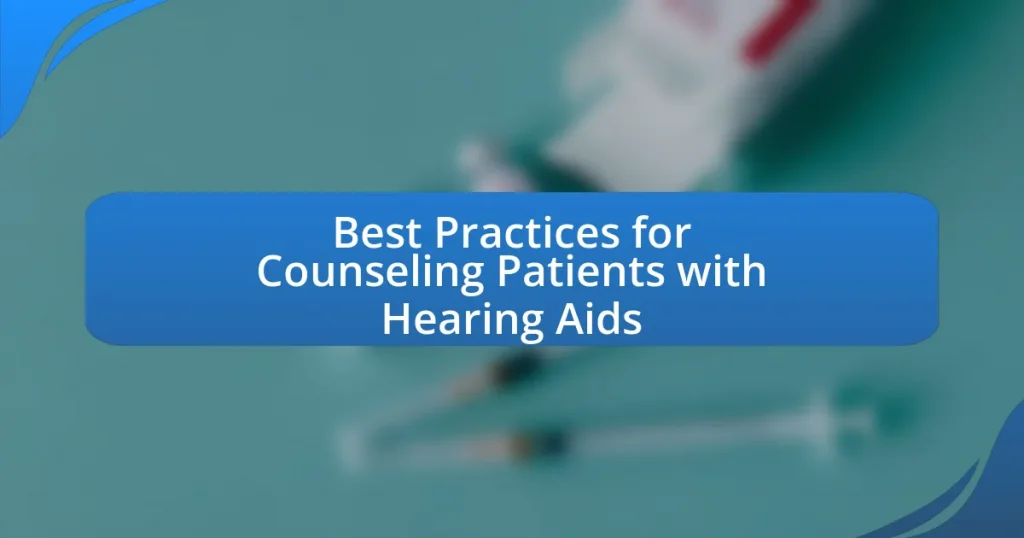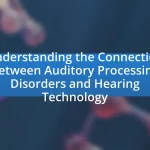The article focuses on best practices for counseling patients with hearing aids, emphasizing the importance of comprehensive education, realistic expectations, and ongoing support. Key strategies include effective communication techniques, such as active listening and the use of clear language, to enhance patient understanding and engagement. It also highlights the significance of addressing common misconceptions about hearing aids, providing reassurance, and ensuring continuous support through follow-up appointments and educational resources. Additionally, the article discusses the role of empathy in building rapport and the integration of technology to improve counseling outcomes.

What are the Best Practices for Counseling Patients with Hearing Aids?
The best practices for counseling patients with hearing aids include providing comprehensive education about the device, ensuring realistic expectations, and offering ongoing support. Educating patients involves explaining how hearing aids work, their benefits, and limitations, which helps patients understand the technology and its impact on their hearing experience. Setting realistic expectations is crucial; patients should be informed that while hearing aids improve hearing, they do not restore it to normal levels. Ongoing support, including regular follow-ups and adjustments, is essential for addressing any concerns and ensuring optimal use of the hearing aids. These practices are supported by research indicating that effective counseling enhances patient satisfaction and device usage, leading to better hearing outcomes.
How can effective communication enhance the counseling process?
Effective communication enhances the counseling process by fostering trust and understanding between the counselor and the patient. When counselors utilize clear, empathetic, and active listening techniques, they create an environment where patients feel valued and understood, which is crucial for effective counseling. Research indicates that effective communication can lead to improved patient satisfaction and adherence to treatment plans, as evidenced by a study published in the Journal of the American Academy of Audiology, which found that patients who experienced better communication reported higher levels of satisfaction with their hearing aid counseling. This demonstrates that effective communication is not only beneficial but essential for successful counseling outcomes.
What techniques can be used to improve patient understanding?
Techniques to improve patient understanding include using clear, simple language, visual aids, and teach-back methods. Clear language reduces confusion and enhances comprehension, while visual aids, such as diagrams or videos, can illustrate complex concepts effectively. The teach-back method, where patients repeat information in their own words, confirms their understanding and allows for clarification of any misconceptions. Research indicates that these techniques significantly enhance patient engagement and retention of information, leading to better health outcomes.
How does active listening play a role in counseling patients?
Active listening is crucial in counseling patients as it fosters a trusting relationship and ensures that patients feel heard and understood. This technique involves fully concentrating, understanding, responding, and remembering what the patient communicates, which enhances the effectiveness of the counseling process. Research indicates that active listening can lead to improved patient satisfaction and adherence to treatment plans, as patients are more likely to engage when they feel their concerns are validated. For instance, a study published in the Journal of Communication in Healthcare found that effective communication, including active listening, significantly impacts patient outcomes and satisfaction levels.
Why is patient education crucial in the hearing aid counseling process?
Patient education is crucial in the hearing aid counseling process because it empowers individuals to make informed decisions about their hearing health and enhances their ability to use hearing aids effectively. Educated patients are more likely to understand the benefits and limitations of hearing aids, which leads to better adherence to treatment and improved satisfaction with their devices. Research indicates that patients who receive comprehensive education about hearing aids experience higher levels of success in adapting to their use, as they are equipped with the knowledge to troubleshoot issues and maintain their devices properly.
What key information should be provided to patients about their hearing aids?
Patients should be informed about the proper use, maintenance, and care of their hearing aids. This includes instructions on how to insert and remove the devices, adjust volume settings, and change batteries. Additionally, patients should be educated on the importance of regular cleaning and storage to ensure optimal performance. Research indicates that proper counseling can significantly enhance patient satisfaction and device usage, as highlighted in the study “Patient Satisfaction with Hearing Aids: A Review of the Literature” by Chisolm et al. (2007), which emphasizes the correlation between patient education and effective hearing aid use.
How can patients be encouraged to ask questions during counseling?
Patients can be encouraged to ask questions during counseling by creating a supportive and open environment. Counselors should actively invite questions by using phrases like “What questions do you have?” or “Is there anything you would like to clarify?” This approach fosters a sense of safety and encourages dialogue. Research indicates that patients who feel comfortable and valued are more likely to engage in discussions, leading to better understanding and adherence to treatment plans. For instance, a study published in the Journal of Patient Experience found that patients who were prompted to ask questions reported higher satisfaction with their counseling sessions.
What role does empathy play in counseling patients with hearing aids?
Empathy plays a crucial role in counseling patients with hearing aids by fostering trust and understanding between the counselor and the patient. This emotional connection allows counselors to better address the unique challenges and emotional responses that patients experience when adapting to hearing aids. Research indicates that empathetic counseling can lead to improved patient satisfaction and adherence to hearing aid use, as patients feel more supported and understood in their journey. For instance, a study published in the Journal of the American Academy of Audiology found that patients who perceived their audiologists as empathetic reported higher levels of satisfaction with their hearing aids and were more likely to follow through with recommendations.
How can counselors demonstrate empathy effectively?
Counselors can demonstrate empathy effectively by actively listening to their clients and validating their feelings. Active listening involves giving full attention, using verbal and non-verbal cues to show understanding, and reflecting back what the client expresses. Validating feelings means acknowledging the client’s emotions as legitimate and important, which fosters a supportive environment. Research indicates that empathetic communication enhances the therapeutic alliance, leading to better outcomes in counseling (Norcross & Wampold, 2011).
Why is building rapport important in the counseling relationship?
Building rapport is crucial in the counseling relationship because it fosters trust and openness between the counselor and the client. This trust enables clients to share their thoughts and feelings more freely, which is essential for effective counseling. Research indicates that a strong therapeutic alliance, characterized by rapport, significantly enhances treatment outcomes, as clients are more likely to engage in the counseling process when they feel understood and supported. For instance, a study published in the Journal of Counseling Psychology found that clients who perceived a strong rapport with their counselors reported higher satisfaction and better progress in therapy.
How can counselors address common concerns and misconceptions about hearing aids?
Counselors can address common concerns and misconceptions about hearing aids by providing clear, factual information and personalized guidance. For instance, many individuals believe that hearing aids are only for the elderly, but research shows that approximately 1 in 5 teenagers experience hearing loss, indicating that hearing aids can benefit a wide age range. Counselors should also clarify that modern hearing aids are discreet, technologically advanced, and can significantly improve quality of life by enhancing communication abilities. Furthermore, addressing concerns about cost by informing patients about insurance coverage options and financial assistance programs can alleviate financial apprehensions. By actively listening to patients’ concerns and providing evidence-based responses, counselors can effectively dispel myths and encourage informed decision-making regarding hearing aids.
What are the most frequent misconceptions patients have about hearing aids?
Patients frequently misunderstand that hearing aids restore hearing to normal levels, when in fact they amplify sounds to assist with hearing loss. Many believe that hearing aids are only for the elderly, while they can benefit individuals of all ages with hearing impairments. Additionally, patients often think that hearing aids are uncomfortable and noticeable, but modern designs prioritize comfort and discretion. Another common misconception is that hearing aids are a one-size-fits-all solution, whereas they require professional fitting and customization for optimal performance. Lastly, some patients assume that hearing aids will eliminate all hearing difficulties, but they are tools that enhance hearing rather than cure hearing loss.
How can counselors provide reassurance to patients regarding their concerns?
Counselors can provide reassurance to patients regarding their concerns by actively listening and validating their feelings. This approach fosters a supportive environment where patients feel understood and respected. Research indicates that empathetic communication significantly enhances patient satisfaction and trust, which are crucial for effective counseling. For instance, a study published in the Journal of Clinical Psychology found that patients who perceived their counselors as empathetic reported lower anxiety levels and greater confidence in managing their concerns. By employing techniques such as reflective listening and summarizing patients’ concerns, counselors can effectively reassure patients and help them feel more at ease with their situations.
What strategies can be implemented to ensure ongoing support for patients?
To ensure ongoing support for patients with hearing aids, implementing regular follow-up appointments is essential. These appointments allow healthcare providers to assess the patient’s adaptation to the hearing aids, address any concerns, and make necessary adjustments. Research indicates that consistent follow-up can significantly improve patient satisfaction and device usage, as evidenced by a study published in the Journal of the American Academy of Audiology, which found that patients who received regular follow-ups reported a 30% increase in overall satisfaction with their hearing aids. Additionally, providing educational resources and support groups can enhance patient engagement and foster a community of shared experiences, further reinforcing the importance of ongoing support.
How can follow-up appointments enhance patient satisfaction?
Follow-up appointments enhance patient satisfaction by providing ongoing support and addressing any concerns related to hearing aid use. These appointments allow healthcare providers to assess the effectiveness of the hearing aids, make necessary adjustments, and ensure that patients are comfortable with their devices. Research indicates that patients who receive regular follow-up care report higher satisfaction levels, as they feel more engaged in their treatment process and confident in their ability to manage their hearing loss effectively. For instance, a study published in the Journal of the American Academy of Audiology found that patients who attended follow-up appointments experienced a 30% increase in overall satisfaction compared to those who did not.
What resources can be provided to patients for continued learning?
Patients can be provided with various resources for continued learning about hearing aids, including educational brochures, online tutorials, and support groups. Educational brochures offer concise information on hearing aid usage, maintenance, and troubleshooting, while online tutorials, often available on manufacturer websites, provide step-by-step guides and videos that enhance understanding. Support groups facilitate peer interaction, allowing patients to share experiences and tips, which can reinforce learning and provide emotional support. These resources collectively empower patients to make informed decisions and improve their hearing aid experience.
How can technology be utilized to improve counseling outcomes?
Technology can be utilized to improve counseling outcomes by integrating telehealth platforms, which enhance accessibility and convenience for patients. These platforms allow counselors to conduct sessions remotely, thereby reducing barriers such as transportation issues and scheduling conflicts. Research indicates that teletherapy can lead to similar or even better outcomes compared to in-person sessions, with a study published in the Journal of Telemedicine and Telecare showing that 90% of participants reported satisfaction with remote counseling services. Additionally, the use of mobile applications can facilitate ongoing communication and support between sessions, allowing for real-time feedback and adjustments to treatment plans. This continuous engagement has been shown to improve adherence to counseling recommendations, ultimately leading to better patient outcomes.
What tools and apps can assist in the counseling process?
Tools and apps that assist in the counseling process for patients with hearing aids include telehealth platforms, hearing aid management apps, and educational resources. Telehealth platforms like Doxy.me and Zoom facilitate remote counseling sessions, allowing counselors to connect with patients conveniently. Hearing aid management apps, such as Oticon ON and Phonak Remote, enable users to adjust settings and access support, enhancing the counseling experience. Educational resources, including websites and mobile apps that provide information on hearing health, empower patients to make informed decisions. These tools collectively improve communication, accessibility, and patient engagement in the counseling process.
How can telehealth services be integrated into patient counseling?
Telehealth services can be integrated into patient counseling by utilizing virtual platforms for consultations, follow-ups, and educational sessions. This integration allows healthcare providers to deliver personalized counseling remotely, ensuring accessibility for patients who may have mobility issues or live in remote areas. Studies indicate that telehealth can improve patient engagement and satisfaction; for instance, a 2020 survey by the American Telemedicine Association found that 74% of patients reported a positive experience with telehealth services. By incorporating telehealth into patient counseling, providers can enhance communication, monitor patient progress, and offer timely interventions, ultimately leading to better health outcomes for patients with hearing aids.
What are the best practices for troubleshooting hearing aid issues during counseling?
The best practices for troubleshooting hearing aid issues during counseling include conducting a thorough assessment of the device, ensuring proper fit and comfort, and educating the patient on maintenance and usage. First, audiologists should systematically evaluate the hearing aid’s functionality by checking for battery life, sound quality, and any physical damage. This step is crucial as studies indicate that improper battery handling is a common issue affecting performance. Next, confirming that the hearing aid fits well and is comfortable can prevent user frustration, which is supported by research showing that discomfort can lead to decreased usage. Lastly, providing clear instructions on how to clean and care for the hearing aid empowers patients, as proper maintenance can significantly enhance device longevity and effectiveness.
How can counselors guide patients through common troubleshooting steps?
Counselors can guide patients through common troubleshooting steps by providing clear, step-by-step instructions tailored to the specific hearing aid model. This guidance often includes checking battery levels, ensuring proper placement of the device, and verifying that the hearing aid is clean and free of obstructions. Research indicates that effective communication and hands-on demonstrations significantly enhance patient understanding and confidence in managing their devices. For instance, a study published in the Journal of the American Academy of Audiology found that patients who received structured troubleshooting education reported a 30% increase in their ability to resolve common issues independently.
What resources can be shared for ongoing troubleshooting support?
Ongoing troubleshooting support for patients with hearing aids can be facilitated through various resources such as user manuals, online forums, instructional videos, and dedicated helplines. User manuals provide specific guidance on device operation and maintenance, while online forums allow users to share experiences and solutions. Instructional videos can visually demonstrate troubleshooting steps, enhancing understanding. Additionally, helplines staffed by audiologists or trained professionals offer personalized assistance, ensuring that patients receive expert advice tailored to their specific issues. These resources collectively empower patients to effectively manage and resolve challenges with their hearing aids.
What practical tips can enhance the counseling experience for patients with hearing aids?
To enhance the counseling experience for patients with hearing aids, practitioners should prioritize clear communication, active listening, and personalized support. Clear communication involves using simple language and visual aids to explain technical concepts, ensuring patients fully understand their hearing aids. Active listening allows counselors to address specific concerns and preferences, fostering a trusting relationship. Personalized support includes tailoring recommendations based on individual lifestyles and needs, which has been shown to improve patient satisfaction and adherence to hearing aid use. Research indicates that effective counseling can lead to better outcomes, with studies showing that patients who receive thorough counseling report higher levels of satisfaction and improved quality of life.


